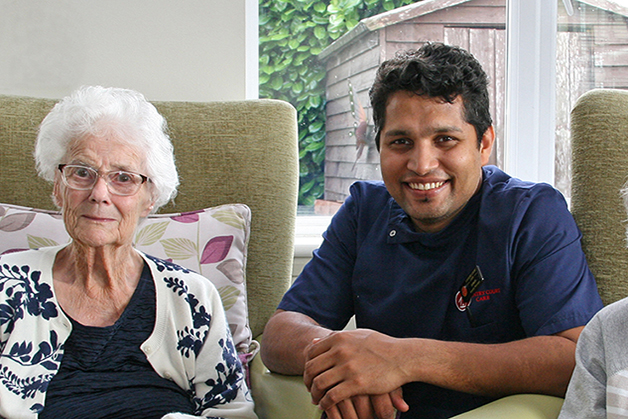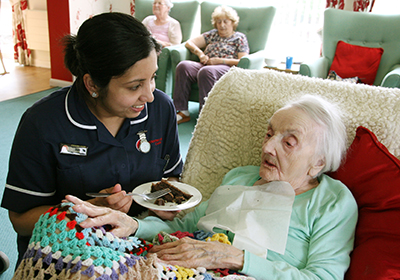In our next few blogs, we’ll be exploring some of the different job roles in our care homes and finding out what it’s like to care for our residents. We asked Registered Mental Health Nurse (RMN) David Stacey what it’s like to be a nurse in a care home.
I qualified as a nurse in 1999 at Nottingham University Training centre in Lincoln, I then joined the NHS working as part of an in-patient assessment team, in a unit for older adults with mental health issues. I worked for the NHS for 16 years, before moving to the private sector.

Nursing in the NHS can be stressful, the pace is relentless and after 16 years that was really starting to take its toll on me. The aim for hospitals is to treat people and move them on through the system as quickly as possible, you never really got to know any of the patients well. I wanted a role where I was able to get to know the patients and see how the care I offered really helped them.
I joined Eccleshare Court in April 2018, I’d been working as an agency nurse and had done some shifts at Eccleshare over the previous 2-3 months. I really liked the home, so I applied for a permanent role here. Prior to this, I worked for United Health in care homes in Lincoln and Scunthorpe so I was familiar with the care home environment.

I felt that I could use my skills in a more meaningful way in a care home, you have much more time with people and don’t just treat them and move them on as quickly as possible. In a care home you get to know a person’s medical history but also their personal background enabling you to build long term relationships not just with them but their families too. You make connections with people that you just don’t get working in acute care. The goal here is about enabling people to have the best possible quality of life, you are not targeted to just move people through the system.
Yes, I thought about going into other areas, but I felt that older people have such a wealth of memories and experiences. I love listening to their stories and hearing about their backgrounds.
My shift starts at 7 am, the first hour is a handover period and shift planning with the night team. Then it’s on to the medication round which can take up to 2 hours. This is the primary care phase of the day and the busiest period, where we assess whether we need to request a GP or District Nurse to come in and see any residents. Lunchtime comes around really quickly, which means another medication round and GPs tend to visit between 12.30 and 2 pm. The afternoon is taken up with care planning and other management tasks, tea time and another medication round begins around 4pm. Finally, we get everything ready to hand over to the night shift and head home around 7.30pm. I do three 12 hour shifts one week and four the following week on rotation, the hours suit me and I love what I do.
I’ve enjoyed doing some training with staff recently, helping to educate my colleagues in the care team about how to manage residents with challenging behaviour. I’ve also done some Dementia information sessions for staff and resident’s relatives. I’m passionate about empowering the care team with knowledge, I think it’s so important to share the knowledge that you have, my background in adult mental health care has been particularly useful here.
I’ve also visited other homes in the Country Court Care group to do some dementia modelling using the Kipwood method with staff. (Tom Kipwood pioneered a person-centred approach to dementia care). I enjoyed the opportunity to share best practice across the group and see some other Country Court Care Homes. Our Home Manager encourages staff from all job roles to get involved with activities with residents, I had one gentleman who was really into his Jazz so we sat and listened to some music together. Due to his dementia, his communication skills were limited and he didn’t participate in many of the group activities, but I could see that he enjoyed our time together and was knowledgeable about the music.
People will be living in a care home for various reasons from general frailty, to dementia at various stages and for end of life care, so it’s not all about end of life. Of course, residents pass away but I see our role as providing a comfortable, pain-free and meaningful end to someone’s journey. It can be tough, but you have to remind yourself of why you do your job. I think about what I would want and how I would want to be cared for. You get much more time with people in a care home setting compared to the NHS, so if someone wants me to sit with them in their last few hours, then I can make time to do that. It can be a very rewarding side of the job and gives you a real sense of fulfilment.
I should also mention that you are very well supported by all of the team, you’re never on your own. The team here all know what they are doing and we all have our role to play. We have excellent links with our local GPs who are never more than a phone call away. In terms of training, we follow NMC guidelines for keeping our skills up to date and any other needs are identified during our appraisals. I’ve recently done some training on sepsis and catheterisation and I’m seeking to update my palliative care knowledge this year too.
A sense of humour is key, you cope better if you can put a positive spin on things and go home with a sense of job satisfaction. Things like being assertive, competent and knowledgeable are important but you also need to be a good communicator and even teacher for some aspects of the role. You need to be able to build relationships with people that can support you from outside the home such as GPs and District Nurses so local knowledge helps too.
If nursing in a care home sounds like something you'd be interested in, we'd love to hear from you. Our nurses are responsible for leading the care team during your shifts, you will make certain that we fully meet residents’ medical, physical and emotional requirements. Ensuring compliance with our clinical governance framework, you will mentor and motivate colleagues, champion residents’ safety and dignity and drive continuous improvement.
You will act as a person in charge; standing in for the Manager as required ensuring high standards of care are provided to residents in line with their Care plan and company policy. As a registered nurse, you will be a role model for care staff. Following an induction period, the registered nurse is expected to carry out all relevant forms of care without direct supervision.
Please email recruitment@countrycourtcare.com for more details.
